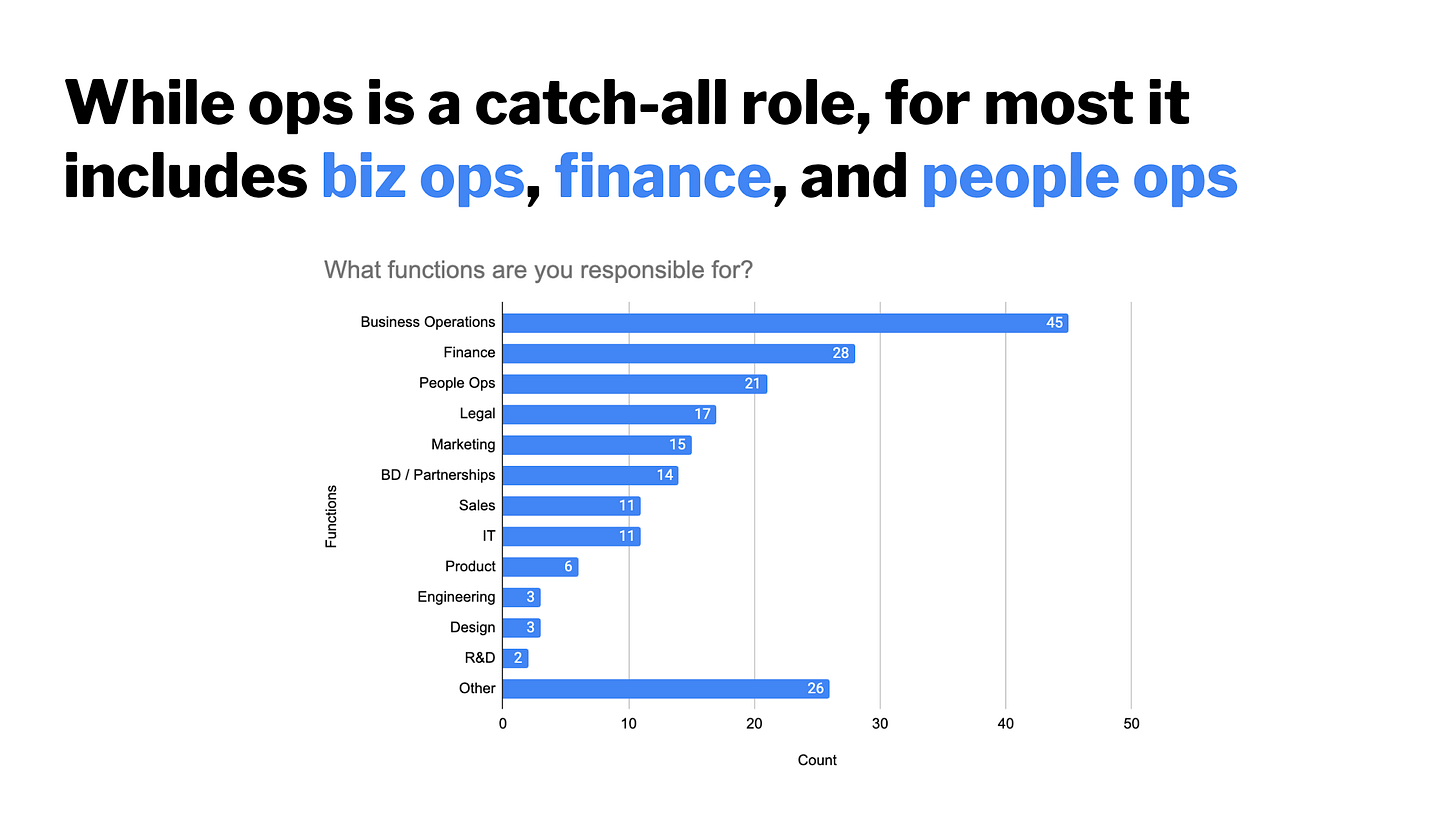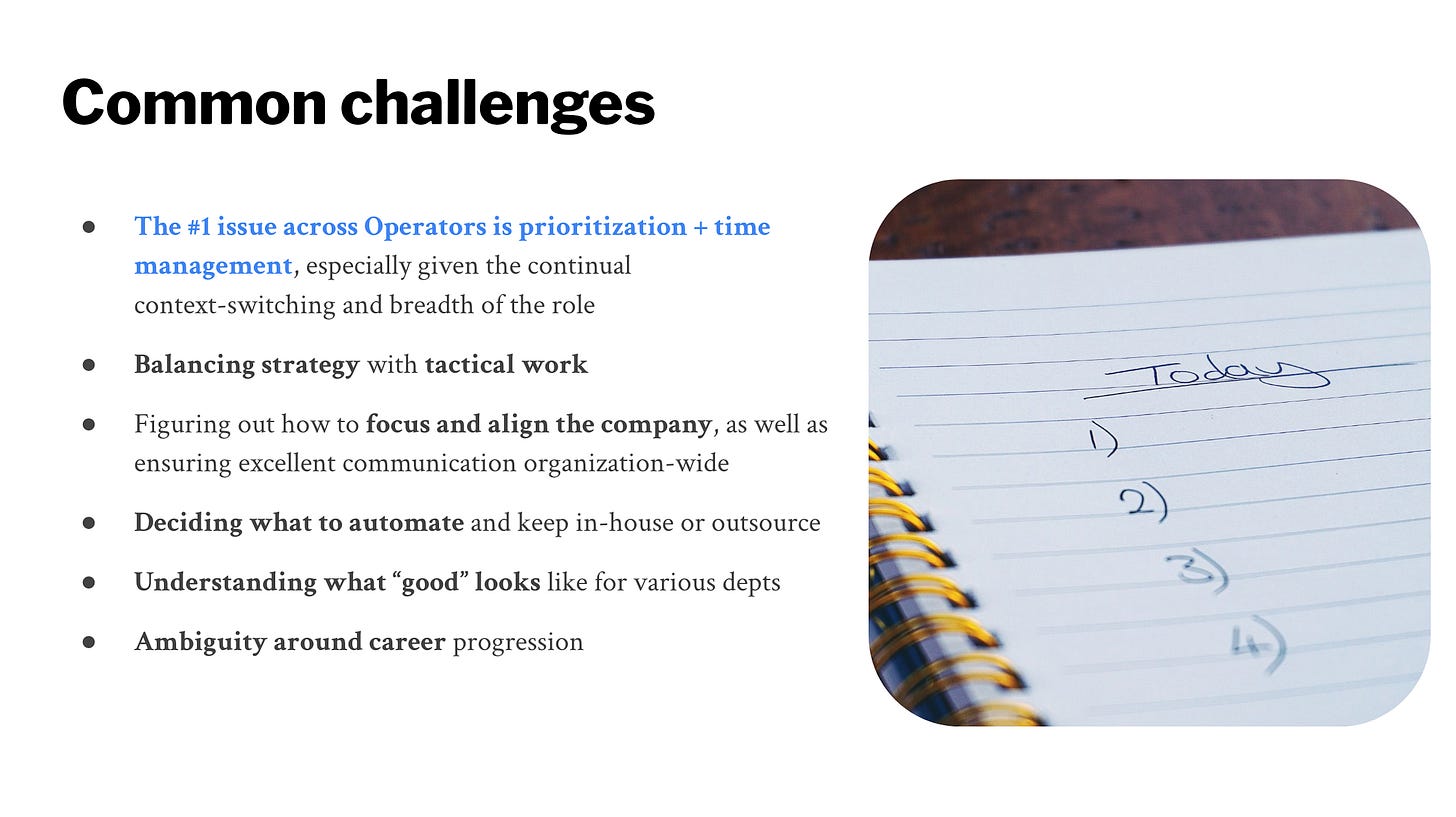Startup ops in action: insights from a survey of 50 startup operators
From "glue people" to "the nerve center of an octopus," startup operators connect the dots and help turn vision into reality.
Operations tends to be a catch-all role in startups, with roles and responsibilities changing over time and as a company matures. It’s an incredibly unique and dynamic role, meaning different things at different companies and stages.
Though I’ve been in startup ops for years, I’ve often wondered how different the roles, responsibilities, and challenges differed across other startups.
To learn more, I recently surveyed 50 operators, across seed to late-stage startups, with the goal of gaining more insight into how the ops role is structured across companies, as well as what common challenges and opportunities exist.
Here’s a summary of key takeaways:
The majority of respondents (72%) came from earlier-stage startups (Series Seed through Series B). I found it fascinating that most startup operators (90%) are non-founders.
As you might expect, the most common titles all had “Operations” in them. The titles seemed to be relatively stage-agnostic (e.g. the COO or VP Ops title could be found in any stage company).
As the above chart shows, startup operators are truly responsible for a wide range of functions. While some folks may have a more specific focus (e.g. GTM or customer success function, or even supply-chain logistics), what’s undeniable is that most startup operators work “in” the business. Most common functions span business operations, finance, people ops, and legal.
Operators who had been at their company for at least a year mentioned that the scope of their role frequently changed as a result of business needs. In particular, multiple people discussed how their career growth (and the number of functions they were responsible for) either grew organically as the business grew — or in some cases, expanded to fill more gaps due to a lack of hiring.
The ops role in general can be described in a number of ways:
A “Head of everything” generalist for the business—someone who can kickstart new functions before there is a need for a FTE, or can fill in any gaps.
The “PM of the business,” who’s tasked aligning the company on KPIs and strategy and enabling the business to run smoothly.
An executor who can “turn vision into reality.” In many cases, an Ops person is a grounding force, especially in relationship to the CEO of the company. If the CEO is “on the business,” the Ops person is “in the business” and is translating the vision into strategic, tactical next steps.
There are so many colorful metaphors to use when describing ops — my favorite was definitely “the nerve center of the octopus” to avoid wildly thrashing arms. 🐙 😂 Otherwise… there were many transportation-related metaphors: keep the wheels on the tracks, keep the engine running smoothly, swap out plane parts while flying it, etc.
By and large, the biggest issue startup operators face is around prioritization and time management. With being stretched across so many different domains, it can be difficult to have enough minutes in the day to catch all the balls in the air. From personal experience, it’s natural to bounce between a 30K view to being nose-deep in the weeds, all within minutes.
Finally, 4 main themes emerged for why startups of all stages can use operations:
Operators can be trusted to get shit done, quickly! Speed is everything in a startup, and great operators help turn vision into reality.
Operators fill in key gaps as the company grows, pinch hitting along the way until there’s enough need to develop a FTE or team around a specific function.
Operators build processes and consistency across the organization, enabling others to stay aligned and move more quickly too.
Operators have a birds-eye view of the organization and understand how to connect the dots across orgs, people, and teams, enabling more efficiency and impact.
Call me biased, but operations are a must-have for any startup. 📈











